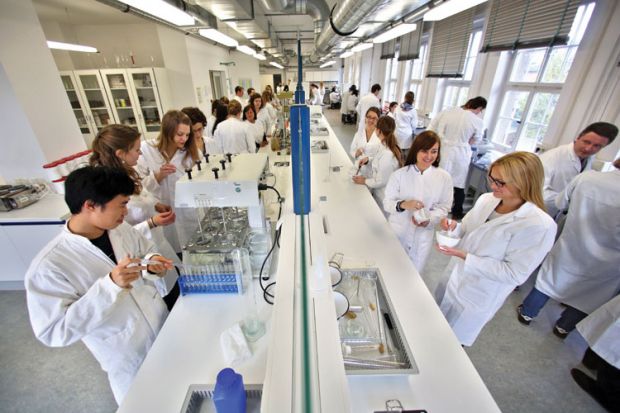Source: Corbis
Temporary measures: postdocs are increasingly unlikely to translate contract work into permanent academic posts
Kristin Krukenberg, a postdoctoral research fellow specialising in systems biology, sees her fellow postdocs spending a lot of their time worrying – but not necessarily about the high-stakes research they are conducting in the laboratory.
Two separate trends – an increase in the number of graduates with doctoral degrees, and a decline in the number of jobs available for them – have converged to create a glut of postdocs in the US that experts fear could discourage some of America’s brightest young minds from pursuing careers in science.
“We are probably already losing good people,” said Dr Krukenberg, who has joined with other postdocs to create an organisation called Future of Research that will advocate for changes to the system. “People are just tired of fighting.”
Some critics say the crisis has been caused by universities continuing to confer doctoral degrees, even as government funding shrank and the number of academic and private-sector jobs for graduates declined, because postdocs were seen as cheap labour to staff the labs of senior scientists.
The number of biomedical graduate students in the US nearly doubled between 1979 and 2009, to 56,800. The National Institutes of Health estimates that the current number of postdocs – who have already received their degrees but who continue to languish on campuses – could be as high as 68,000.
That has meant a steady supply of people to work in the labs of senior scientists, which is considered a traditional step in the progression from doctorate to research career. But it has also caused that step to be extended. Postdocs who finally obtain university positions – and this has declined from 34 per cent of people with biomedical PhDs in 1993 to 26 per cent today – are now, on average, 37 years old, the NIH says. And they do not receive their first research grants until they are 42, compared with an average age of 34 in 1970.
“It is in some ways the very worst of times because of what we did to make it that way,” Henry Bourne, a professor emeritus at the University of California, San Francisco School of Medicine, told a symposium held to launch Future of Research.
“We’ve got this huge postdoc holding tank. We’ve created a system in which the purpose of graduate school is to produce postdocs.”
Brain drain
One result is that some 44 per cent of doctoral students now give up before earning their degrees, and one in three of those who do finish end up leaving research, according to a study by Professor Bourne. Only about a third of students who start PhD programmes ultimately become researchers, he found.
“Great people leave or don’t enter science because of the low career prospects and compensation,” one postdoc wrote in an anonymous survey conducted by Future of Research. “The way we’re funded forces us to spend more time scrambling for money than actually doing research,” wrote another.
The fastest-growing careers now being entered by graduates with doctorates, the NIH found, do not require time-consuming and expensive graduate degrees at all.
“I don’t believe we’re training too many PhDs. A PhD in the sciences is fabulous preparation for a huge number of careers, most of which do not require postdoctoral training,” said Gregory Petsko, professor of neurology at Weill Cornell Medical College, who chaired a committee for the National Academy of Sciences whose report about the issue is due out soon. “The problem is with the postdoc [position]. The postdoc should only be something that you do if you need advanced training for research.”
He continued: “We have to change the culture so that postdoc [positions] are harder to get, they mean more if you get one, and it’s clear what they’re about – that they’re not just a holding pattern.”
Paying postdocs more than the very low salaries they get for laboratory work would also help to solve the problem, he suggested.
“We would finally be giving these immensely talented people a living wage, and it would force labs to have fewer postdocs,” Professor Petsko said.
As for Dr Krukenberg, who is 34, she has begun to look for jobs beyond her fellowship. As someone who was trained at Harvard University, she is confident she will do well, but some of her contemporaries at other institutions remain fearful.
“There’s a lot of worry and stress about what we’re going to do next. Will people be able to find academic jobs and, if not, industry jobs?” Dr Krukenberg said.
But she warned: “If you’re spending all your time dealing with stuff that’s not about the science, you do lose some of that precious time to think creatively. Now, there’s a feeling that to get a grant you have to propose something that’s safe. But the leaps that really happen in science come when people have the time to try those crazy ideas.”
Register to continue
Why register?
- Registration is free and only takes a moment
- Once registered, you can read 3 articles a month
- Sign up for our newsletter
Subscribe
Or subscribe for unlimited access to:
- Unlimited access to news, views, insights & reviews
- Digital editions
- Digital access to THE’s university and college rankings analysis
Already registered or a current subscriber? Login





